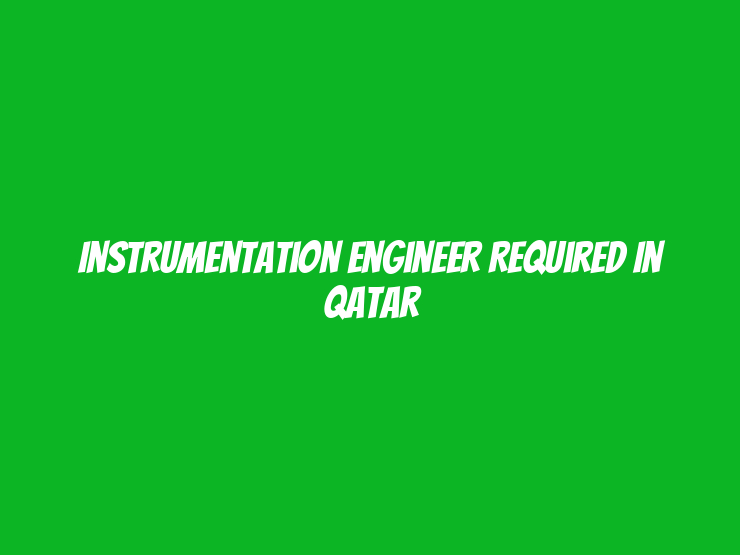An Instrumentation Engineer is responsible for designing, developing, installing, and maintaining instruments and control systems that measure and regulate various industrial processes. These systems are vital to industries such as manufacturing, oil and gas, chemical production, and power generation, where precise control of factors like temperature, pressure, flow, and levels is crucial for efficiency, safety, and reliability.
Instrumentation Engineers ensure that all control systems operate correctly and integrate seamlessly with larger plant operations. Their expertise in selecting and configuring instrumentation helps optimize processes, improve product quality, and reduce operational costs. They also play a critical role in ensuring that systems comply with safety standards and environmental regulations.
| Salary | Market Competitive |
| Experience | 3 – 4 years |
| Location | Qatar |
| Qualification | Bachelor Degree in Engineering |
| Posted | 16 October 2024 |
| Job Type | Full-Time |
| Posted by | Habeebi Recruiter |
| last date to apply | apply within 15 days of posting |
Key Responsibilities of an Instrumentation Engineer
- Designing and Developing Control Systems: A primary responsibility of an Instrumentation Engineer is to design and develop control systems that monitor and control variables such as pressure, temperature, and flow within industrial processes. This involves selecting the appropriate sensors, controllers, and actuators for each application. Engineers must ensure that the system design meets the operational requirements, adheres to industry standards, and can handle the environmental conditions where the instruments will be used.
- Installing and Commissioning Instruments: Instrumentation Engineers are responsible for overseeing the installation and commissioning of instrumentation systems. This includes ensuring that all instruments are installed correctly and are calibrated according to the manufacturer’s specifications. During commissioning, the engineer verifies that the system performs as expected and integrates seamlessly with the broader plant control systems.
- Troubleshooting and Maintenance: Instrumentation Engineers are also tasked with troubleshooting and maintaining instrumentation systems to ensure continuous and reliable operation. When instruments fail or operate outside expected parameters, engineers must quickly identify the cause and implement repairs or recalibrations. Regular maintenance is also crucial to avoid unplanned shutdowns and ensure long-term reliability.
- Ensuring Compliance with Safety Standards: Safety is a top priority in industries where Instrumentation Engineers work. These engineers ensure that all instruments and control systems comply with national and international safety standards such as IEC, OSHA, or ISO regulations. They are responsible for the safe operation of control systems that protect the plant from dangerous conditions like pressure overloads or toxic gas leaks.
- Calibration and Testing: Another critical responsibility is to calibrate and test instrumentation systems regularly. Calibration ensures that instruments provide accurate readings, which is essential for process control and product quality. Engineers must also conduct periodic testing to ensure that the control systems are functioning correctly and to detect any potential issues before they impact operations.
- Collaborating with Cross-Functional Teams: Instrumentation Engineers frequently work with other engineering disciplines such as electrical, mechanical, and process engineers to integrate instrumentation into broader systems. They also collaborate with operations and maintenance teams to ensure that the control systems meet the operational needs of the plant. Effective communication and teamwork are essential for the successful implementation of control systems.
- Upgrading and Optimizing Control Systems: Instrumentation Engineers are often involved in upgrading and optimizing existing systems to improve efficiency, reduce costs, or enhance safety. This may involve integrating new technology, improving system reliability, or implementing advanced process control techniques. These optimizations help industrial facilities stay competitive and compliant with evolving regulations.
- Managing Documentation and Compliance: Instrumentation Engineers must maintain comprehensive documentation of system designs, calibrations, and maintenance activities. Accurate records are essential for audits, troubleshooting, and regulatory compliance. This documentation also serves as a reference for future upgrades or expansions of the control systems.
Skills and Qualifications
An Instrumentation Engineer typically holds a Bachelor’s degree in Instrumentation Engineering, Electrical Engineering, or a related field. Practical experience in instrumentation and control systems is essential, and many engineers further their qualifications with certifications from organizations like the International Society of Automation (ISA).
Key skills for an Instrumentation Engineer include strong problem-solving abilities, attention to detail, and expertise in the use of automation software and control technologies. Knowledge of industry-specific standards and safety regulations is also crucial, as is proficiency in system design, troubleshooting, and calibration.
Conclusion
Instrumentation Engineers are critical to the efficient, safe, and reliable operation of industrial processes. By designing and maintaining sophisticated control systems, they ensure that plants run smoothly, products meet quality standards, and operational costs are minimized. Their role also contributes significantly to workplace safety and regulatory compliance, making them indispensable to industries that rely on precise control of complex processes.
How to apply:
Send your updated resume to our email:
Email: admnhrskylexqa@gmail.com

